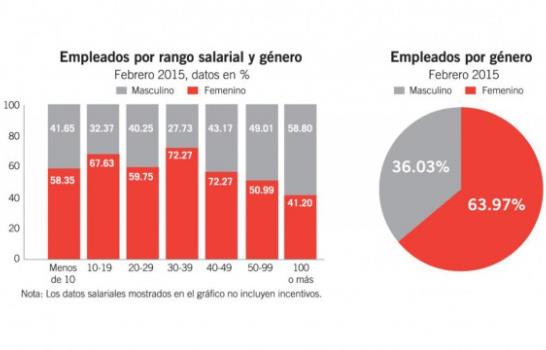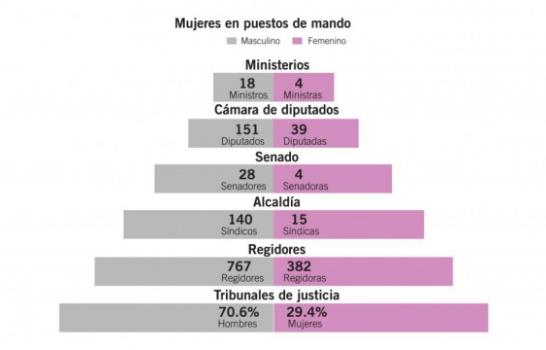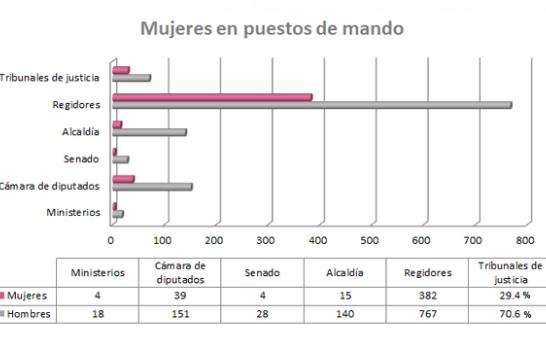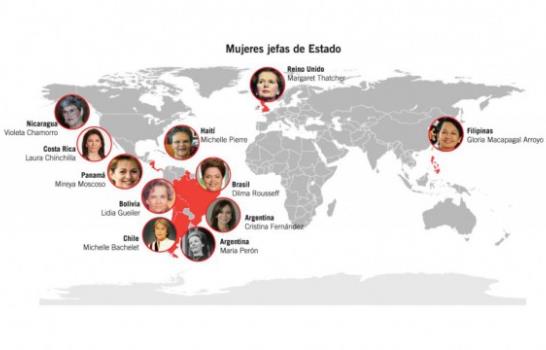High heels on "men's terrain"
Salaries and high positions arrive in trickles for women of the public sector
For years, the political history of the Dominican Republic has been and is a man's terrain. Although the major percentage of the Dominican government's employees are of the feminine sex, the men are the ones who receive the best salaries and occupy the highest leadership positions.
Salary statistics of 159 public entities evaluated by the System of Administration of Public Servants (SASP), show this. Of 287,731 employees, 184,061 are women and 103,670 are men, for a division of 64% versus 36%. Most of the salary is concentrated between those employees who received less than RD$10,000 and up to RD$39,000, a total of 92%, an area which is dominated by the women. Nevertheless when we are dealing with salaries of RD$40,000 to more than RD$100,000, the men are those who receive these benefits.
In the Ministry of Economy, Planning and Development, of 720 employees that work in their headquarters, 49 men earn between RD$100,000 and RD$300,000, while 33 women receive this amount.
According to a tally of the payrolls of February and March of this year carried out by Diario Libre, of 155 employees in the Ministry of the Presidency, 15 men earn between RD$100,000 and RD$300,000 and 11 women received the same amounts. In the meantime, in the Ministry of Hacienda, of 870 fixed employees, 36 men and only 22 women are at this salary level.
"This shows that what is occurring is that although there is a greater number of women than men in the public sector, when the proportion of salary rank is broken down, what one finds is that as salaries increase, the proportion of women falls," explains economist Pavel Isa Contreras.
In his judgment, the higher salary ranges are probably associated with positions of power and of command, where the men acquire greater prominence.
Recent information published by the Center of Gender Studies of the Technological Institute of Santo Domingo (Intec), indicate that of 22 ministries in the Dominican government, only four have women ministers, which places the country in the next-to-last rank among the nations with the fewest number of women in these positions.
In Latin America, the Dominican Republic and Uruguay are the countries with the least percentage of women shown in their congresses. In the Chamber of Ceputies the country has 39 female legislators of a total of 190 seats; while in the Senate there are only four females Senators of a total of 32. It should be underlined that for the first time in its history the Senate is presided over by a woman.
According to the analysis called "Women, participation and citizenship in the Dominican Republic. Achievements, challenges and stations," in the local governments there are 155 mayors positions, only 15 are led by women, while there are only 382 city council members who are female among a total of 1149.
"Finally in an additional space in the national political life, not subject to election by a citizens' vote, in which we can put into evidence the underrepresentation of women, are the highest courts of justice of the country, in which females represent only 29.4% of the total number of existing judges," underlines the study published this year.
A battlefield
Rosa Urania Abreu is conscious of the fact that in order to be recognized and reach a leadership position in the labor market she has to work three times more than a man. She knew that in order to displace them, she would have to "push, and open spaces."
As if this were a battlefield, she imposed her knowledge even knowing that she was in a terrain traditionally reserved for the opposite sex. "I knew that I had to give a lot more.... I was on a man's terrain, of civil engineers, so it was very much in doubt that a woman could do the work, it was very subtle, but I felt it clearly and I was conscientious of the fact that I had to demonstrate a lot more," she recalls.
Abreu began to work in the public sector at 16. When she graduated as a chemical engineer she was the first woman to go into the area of drinking water.
The years of effort, perseverance and preparation, carried her to the rank of a Deputy Minister of the Environment and the post of technical assistant to the director of the Santo Domingo Water and Sewer Corporation (CAASD). "When I managed to graduate as an engineer I was already far ahead of many men, nevertheless, I did not feel that this was shown, I came to be recognized and valued professionally in the public sector after 35 years," she said.
After consolidating her position at a high level, she no longer feels discrimination. She assured reporters that she has had good salaries and now earns the same or more than the men of her rank within the State." I know that I was always helped by some international persons, which is to say, I felt that I took a step forward if someone from outside came and saw my work, because I was outstanding. What was hard was to show what I could do," she added.
Political jobs
For the feminists, government jobs are "political positions" that did not take into account professional ability. "From the state there is exclusion and underrepresentation of women, in spite of the fact that they have better professional profiles than the men in the public administration," said feminist Sergia Galvan.
For some, the Ministry of Foreign Relations is an example of this. At the death of the former Chancellor Carlos Morales Troncoso, "it was expected that they would put into the job the Deputy Chancellor Alejandra Liriano, but they placed an architect who knows little of diplomacy," questioned some sources.
Liriano has worked in the Chancellery since 1996 and although she recognizes that the disparity with women exists, she says she is content with her post. "When I take part I do not necessarily feel that having the highest position is the only matter to work, from where I am I can do a lot for the country, which is to say, I can help with the processes that occur," emphasized the Deputy Chancellor.
Violation of the laws
Constitution is specific in its article 39, numeral 5, regarding the importance that the state promote and guarantee "the balanced participation of women and men in the candidacies to popular elective jobs that are leadership and decision-making positions in the public environment, in the administration of justice and in the agencies of control of the state."
The Electoral Law Num. 275 - 97 establishes in addition a minimum quota for women of 25% to the elective posts in the Chamber of Deputies and on the City Councils. "But in addition, the Dominican state has taken on the commitment with regard to human rights on parity and equality which it does not comply with either," added Galvan.
In the last 40 years, 10 women have been presidents in Latin America, nevertheless, in 171 years of constitutional history (1844 - 2015), the Dominican Republic has managed to be one of the big absentees in the region regarding this item.
Salary statistics of 159 public entities evaluated by the System of Administration of Public Servants (SASP), show this. Of 287,731 employees, 184,061 are women and 103,670 are men, for a division of 64% versus 36%. Most of the salary is concentrated between those employees who received less than RD$10,000 and up to RD$39,000, a total of 92%, an area which is dominated by the women. Nevertheless when we are dealing with salaries of RD$40,000 to more than RD$100,000, the men are those who receive these benefits.
In the Ministry of Economy, Planning and Development, of 720 employees that work in their headquarters, 49 men earn between RD$100,000 and RD$300,000, while 33 women receive this amount.
According to a tally of the payrolls of February and March of this year carried out by Diario Libre, of 155 employees in the Ministry of the Presidency, 15 men earn between RD$100,000 and RD$300,000 and 11 women received the same amounts. In the meantime, in the Ministry of Hacienda, of 870 fixed employees, 36 men and only 22 women are at this salary level.
"This shows that what is occurring is that although there is a greater number of women than men in the public sector, when the proportion of salary rank is broken down, what one finds is that as salaries increase, the proportion of women falls," explains economist Pavel Isa Contreras.
In his judgment, the higher salary ranges are probably associated with positions of power and of command, where the men acquire greater prominence.
Recent information published by the Center of Gender Studies of the Technological Institute of Santo Domingo (Intec), indicate that of 22 ministries in the Dominican government, only four have women ministers, which places the country in the next-to-last rank among the nations with the fewest number of women in these positions.
In Latin America, the Dominican Republic and Uruguay are the countries with the least percentage of women shown in their congresses. In the Chamber of Ceputies the country has 39 female legislators of a total of 190 seats; while in the Senate there are only four females Senators of a total of 32. It should be underlined that for the first time in its history the Senate is presided over by a woman.
According to the analysis called "Women, participation and citizenship in the Dominican Republic. Achievements, challenges and stations," in the local governments there are 155 mayors positions, only 15 are led by women, while there are only 382 city council members who are female among a total of 1149.
"Finally in an additional space in the national political life, not subject to election by a citizens' vote, in which we can put into evidence the underrepresentation of women, are the highest courts of justice of the country, in which females represent only 29.4% of the total number of existing judges," underlines the study published this year.
A battlefield
Rosa Urania Abreu is conscious of the fact that in order to be recognized and reach a leadership position in the labor market she has to work three times more than a man. She knew that in order to displace them, she would have to "push, and open spaces."
As if this were a battlefield, she imposed her knowledge even knowing that she was in a terrain traditionally reserved for the opposite sex. "I knew that I had to give a lot more.... I was on a man's terrain, of civil engineers, so it was very much in doubt that a woman could do the work, it was very subtle, but I felt it clearly and I was conscientious of the fact that I had to demonstrate a lot more," she recalls.
Abreu began to work in the public sector at 16. When she graduated as a chemical engineer she was the first woman to go into the area of drinking water.
The years of effort, perseverance and preparation, carried her to the rank of a Deputy Minister of the Environment and the post of technical assistant to the director of the Santo Domingo Water and Sewer Corporation (CAASD). "When I managed to graduate as an engineer I was already far ahead of many men, nevertheless, I did not feel that this was shown, I came to be recognized and valued professionally in the public sector after 35 years," she said.
After consolidating her position at a high level, she no longer feels discrimination. She assured reporters that she has had good salaries and now earns the same or more than the men of her rank within the State." I know that I was always helped by some international persons, which is to say, I felt that I took a step forward if someone from outside came and saw my work, because I was outstanding. What was hard was to show what I could do," she added.
Political jobs
For the feminists, government jobs are "political positions" that did not take into account professional ability. "From the state there is exclusion and underrepresentation of women, in spite of the fact that they have better professional profiles than the men in the public administration," said feminist Sergia Galvan.
For some, the Ministry of Foreign Relations is an example of this. At the death of the former Chancellor Carlos Morales Troncoso, "it was expected that they would put into the job the Deputy Chancellor Alejandra Liriano, but they placed an architect who knows little of diplomacy," questioned some sources.
Liriano has worked in the Chancellery since 1996 and although she recognizes that the disparity with women exists, she says she is content with her post. "When I take part I do not necessarily feel that having the highest position is the only matter to work, from where I am I can do a lot for the country, which is to say, I can help with the processes that occur," emphasized the Deputy Chancellor.
Violation of the laws
Constitution is specific in its article 39, numeral 5, regarding the importance that the state promote and guarantee "the balanced participation of women and men in the candidacies to popular elective jobs that are leadership and decision-making positions in the public environment, in the administration of justice and in the agencies of control of the state."
The Electoral Law Num. 275 - 97 establishes in addition a minimum quota for women of 25% to the elective posts in the Chamber of Deputies and on the City Councils. "But in addition, the Dominican state has taken on the commitment with regard to human rights on parity and equality which it does not comply with either," added Galvan.
In the last 40 years, 10 women have been presidents in Latin America, nevertheless, in 171 years of constitutional history (1844 - 2015), the Dominican Republic has managed to be one of the big absentees in the region regarding this item.


 Kirsis Díaz
Kirsis Díaz



 Kirsis Díaz
Kirsis Díaz